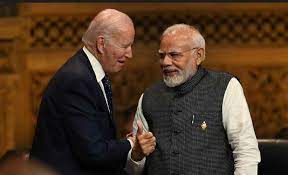It is the first instance when the United States’ consent to deal with terrorist attacks on India’s borders was mentioned in a joint press conference.
Rahul Gandhi and his domestic and foreign supporters, through their propaganda of misinformation during the past months, spared no effort to tarnish India’s democratic fabric. They spread misinformation about alleged suppression of the media, and atrocities against minorities. Organizations and leaders backed by Pakistan, China, or under the guise of human rights in Europe and America, carried out a sustained campaign against Prime Minister Narendra Modi and India. However, all their tactics failed. In the United States Congress, Prime Minister Modi’s historic and resolute speeches received applause 15 times, acknowledging the success achieved in upholding democratic ideals, benefiting the entire society, achieving economic heights, and fostering international peace and goodwill. In the past five decades, I have had the opportunity to cover the press team accompanying several Prime Ministers, including Rajiv Gandhi, Narasimha Rao, Inder Kumar Gujral, Atal Bihari Vajpayee, and Manmohan Singh, during their visits to the United States and covering their speeches in Parliament and the United Nations General Assembly. However, for Modi, I saw unprecedented enthusiasm and support among the diaspora. Modi publicly acknowledges that this respect is, in fact, a tribute to the strength and growing economic power of India’s 1.4 billion people.
The strategic security agreements reached during PM Modi’s State visit to the United States is an acknowledgment of Pakistan’s nurturing of terrorism, as well as China’s expansionist behaviour, and are significant for most countries worldwide in their relationship with India. Similarly, the new partnerships in technology and economic sectors will equally benefit the United States and India. It is the first instance when the United States’ consent to deal with terrorist attacks on India’s borders was mentioned in a joint press conference. Not only the United States, but also the majority of countries in the world commend India’s efforts to combat terrorism and promote peace in various regions, including Ukraine. On this new juncture of US-India relations, certain old facts come to mind. During Prime Minister Rajiv Gandhi’s visit to the United States in June 1985, President Ronald Reagan and his administration set aside past animosities and warmly welcomed the young leader, making efforts to please him. This journey also provided the benefit of witnessing NASA’s space center. As a result, the participating leaders, officials, and journalists started envisioning American collaboration in India’s space programs. However, later on, we criticized the United States for refusing to provide supercomputers and not controlling the activities of anti-India Khalistani terrorists. Similarly, despite imposing some restrictions on India’s nuclear tests or later hindering technology transfer in the aftermath of the Indo-US nuclear deal with Manmohan Singh, complete goodwill towards the United States was not possible. However, over the past few years, through various national and international initiatives of Prime Minister Narendra Modi’s government, the United States has not only agreed to provide technology for the most advanced F-414 fighter jet engines, but has also entered into partnerships in space research with ISRO and NASA’s missions. This is a historic achievement for India because the United States does not readily consent to technology transfer even to many of its NATO partner countries. At present, India is proving to be the right partner for the United States in countering China and providing relief from economic problems faced by the United States and European countries.
American companies are eager to enhance economic relations. India’s vast market, educated and skilled workforce, modern education, strong financial institutions, and popular democratic system with effective leadership, are providing significant investment opportunities for the US government and companies on a large scale.
Not only that, with the purchase of 500 aircraft by Air India, a subsidiary of the Tata Group, thousands of people will find employment in the United States. On the other hand, the American administration is not allowing criticism of human rights issues by certain groups of lawmakers or organizations to adversely affect bilateral relations. India’s argument holds weight for them that terrorism or Maoist violence cannot be tolerated under any circumstances, as their violence has claimed the lives of thousands of innocent people.
As far as democracy is concerned, elections are taking place from the grassroots level to Parliament, and there are governments of nearly twenty parties in various states. The welfare schemes of the Modi government are benefiting people from all social classes, castes, and religions.
In the midst of this era of success, an interesting discussion has started to emerge in the United States and India. It is being understood that the United States, Russia, Britain, France, Germany, Japan, Australia, several African and Islamic countries have started seeing Prime Minister Narendra Modi as a world peace envoy, along with the leaders of the G20 nations. Hence, he could also be considered as the most suitable leader for the next Nobel Peace Prize. After all, around 31 prime ministers or presidents have been recipients of the Nobel Peace Prizes in the past. Only British Prime Minister Winston Churchill received the Nobel Prize in Literature. Many heads of state, including Willy Brandt, Anwar Sadat, and Nelson Mandela, as well as several leaders of smaller countries, have already been honoured for their international peace efforts. Dalai Lama and Yasser Arafat have also been honoured. Therefore, now India has become a leading force for the interests of the global community in every way.
The writer is editorial director of ITV Network—India News and Dainik Aaj Samaj.

